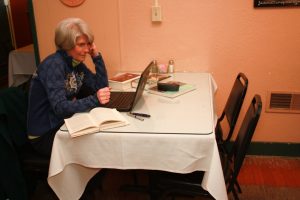
I know from my previous biography that the actual writing moves slower and slower in the second half of a book and that the pre-writing before each chapter takes more and more time. The challenge for me right now is to figure out what I need to do to get to the “starting line” – that is, the place where I actually feel confident enough to put words on the blank page of the new chapter in front of me.
Something that I think will help me before writing chapter 7 is a series of mini-timelines. I already have an extensive timeline for the biography as a whole, but I need to know more about my subject’s evolving opinions and beliefs. I not only need to know what she thought but when and how she came to think it. How did she arrive at her views on, say, divorce or pacifism or prohibition or women’s rights? It might also be helpful to have mini-timelines on her relationship with her mother or her father or her close friends to pinpoint places in her life when she drew close or pulled away from them for one reason or another. So I’m going to spend some days combing through my mega-timeline and the indices of the biographical research I’ve gathered and put together some individual thought/belief-centered timelines that will bring me deeper into my subject’s head and possibly expose some new connections between her thinking, the particular events of her life, and wider historical events.
After I get them started, these mini-timelines will be ongoing research. As I write later chapters, I may find something in a letter or some other document that I’ll plug in to one of my mini-timelines. These ongoing discoveries might cause me to go back and rethink what I’ve written in previous chapters. When that happens, I don’t see it as a mistake, but as a sign that I’m really getting to know my subject, that I’m coming closer and closer to understanding who she is.

